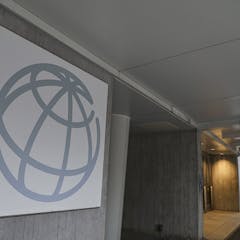
Articles on International Monetary Fund (IMF)
Displaying 1 - 20 of 215 articles

Development finance addresses the failures or limitations of financial institutions such as commercial and investment banks.

Cuts could really help squeezed households.

The current approach to debt restructuring has failed Zambia.

Sri Lanka is just one of a number of countries in which IMF loan conditions appear to be mainly burdening supporters of the opposition.

Infrastructure is always a vexed issue. The program is full of pork barrelling, whoever is in power. Even when that’s not involved, what to build and when it should be built is often contested.

In this podcast, independent economist Chris Richardson joins The Conversation to discuss a rate rise, "sticky" inflation, the fall in the standard of living, and a bleak prospect as we go into 2024.

Many sources of finance, including those from the World Bank and IMF, don’t adequately cater for African nations’ specific needs.

The IMF’s US57 billion bailout to Argentina in 2018 was the biggest loan it has ever extended.

Almost two-thirds of low-income countries are at risk of debt distress – in part because of higher borrowing costs. And that isn’t the only problem.

There is increased demand to join BRICS in the emerging world order, partly as a countervailing power to “the west”.

This week’s summit for a “New Global Financing Pact” will look to secure some much-needed climate cash for developing countries, while ensuring their debt remains manageable.

Ghana’s deal with the IMF is the 17th in its history.

The bank has set hares running by forecasting actual growth of the UK economy in 2023, while most other forecasters are more downbeat.

Alongside the global economic outlook, Russian supply and Chinese demand are contributing to ‘a cocktail of uncertainty’ for oil prices.

The Albanese government had no intention of giving the Low and Middle Income Tax Offset a further lease of life. It just would have preferred that a pesky journalist hadn’t highlighted the fact

It’s a crucial time for the World Bank, with growing calls for reform and sky-high expectations of what one leader needs to do. A former World Bank official explains the challenges ahead.

Thirty years ago the World Bank recognised that its position was untenable. It put in place mechanisms to make the bank more accountable to ordinary people.

In being grey listed South Africa joins a list of countries with poor governance. Others are war zones or countries with jihadist terror groupings operating on their land.

William Ruto is determined to reduce public debt by collecting more taxes to pay for what the country needs.

Chalmers has bought himself a doozy of a conversation, with his essay advocating we embrace “values-based capitalism”
